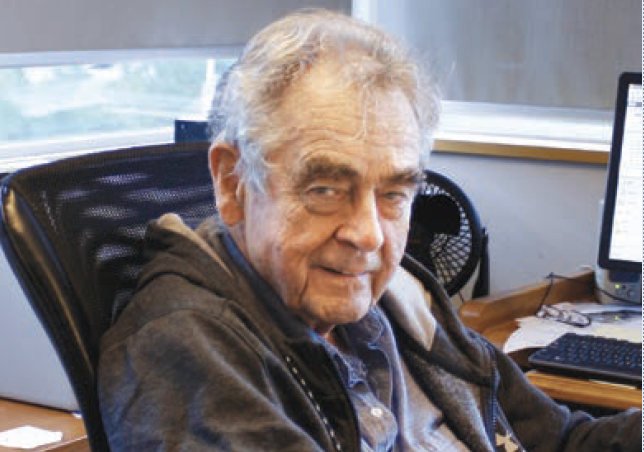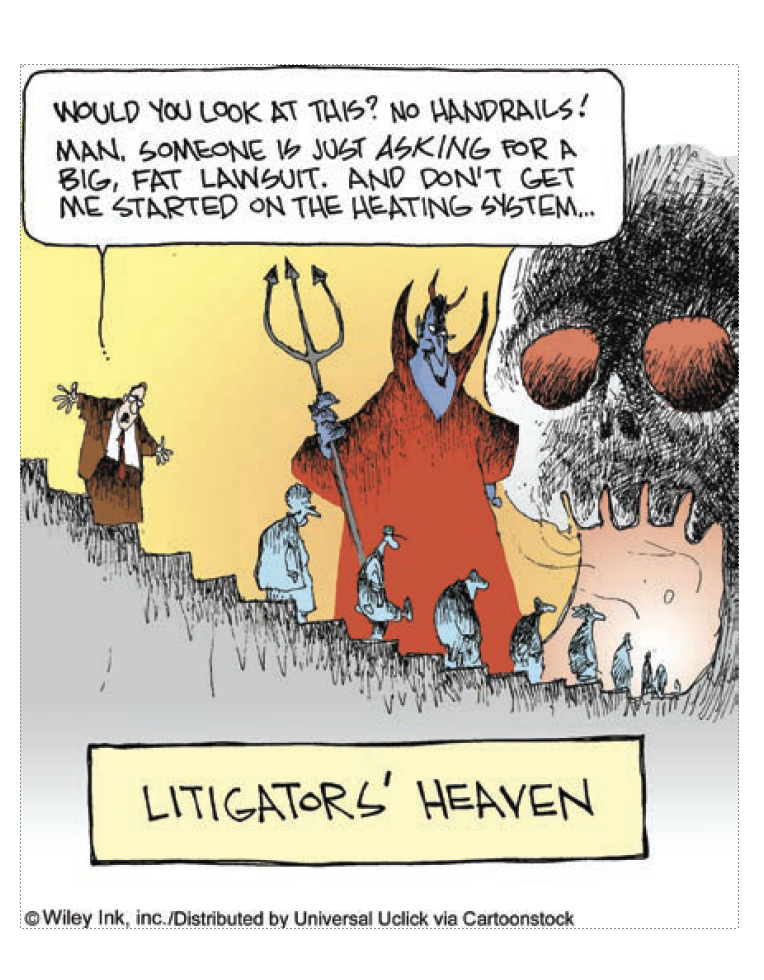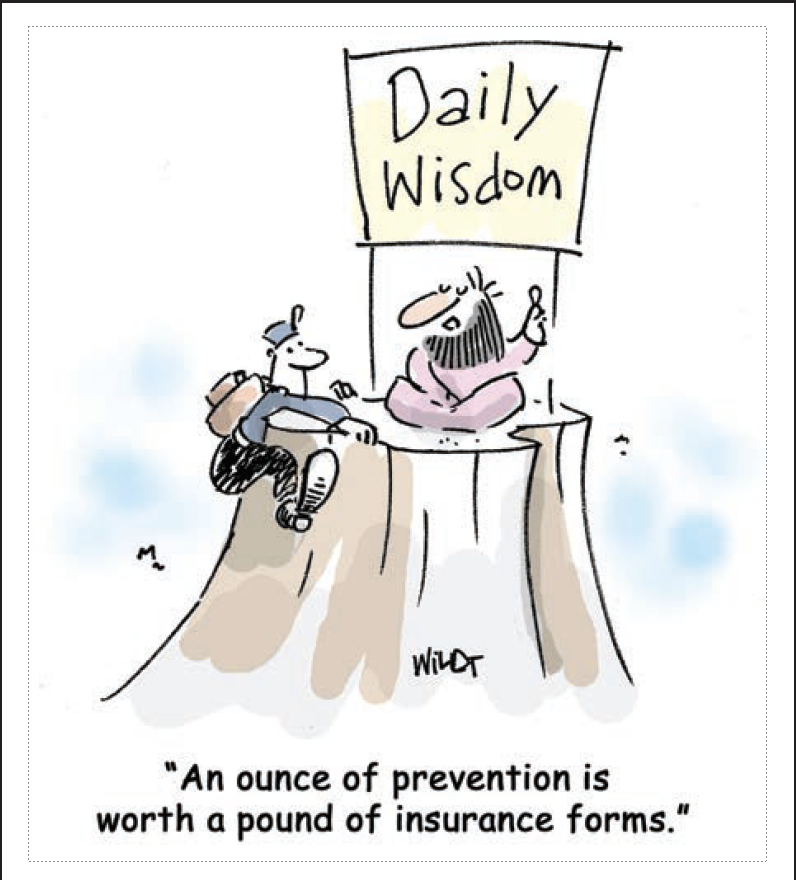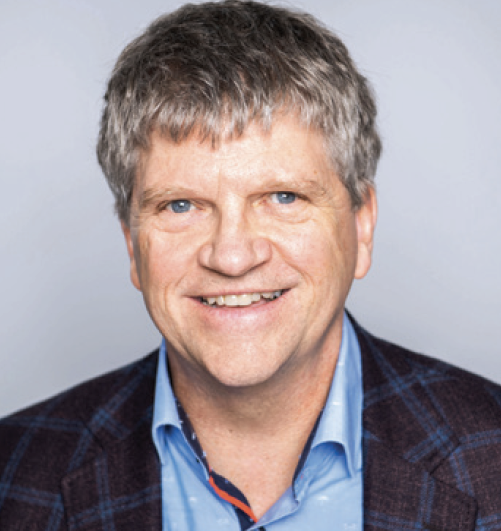The Straight Line Newsletter — Issue #9
This is the ninth issue of The Straight Line, a newsletter that appears several times throughout the year. Articles cover a broad range of topics that engage Ontario architects insured by Pro-Demnity, other OAA members – whether in practice or engaged in other businesses – and anyone with an interest in the profession.
We encourage readers to suggest topics. Please send any suggestions to:
editor@pd-straightline.com

David Croft: Not shy, but retiring
The name David Croft, OAA, FRAIC is not one that regularly pops up in glossy architectural magazines or awards citations. In fact, you may not recognize the name at all – unless, that is, you have been involved in one of the nearly 6,000 claims for professional errors and omissions that Pro-Demnity Insurance (and the Indemnity Plan before that) has handled over the past 30-plus years. In that case, you would know David well, as the “Claims Manager” (also Vice President of Claims), whose job it has been to advise individual practices, and defend the profession as a whole against disrepute, embarrassment, and financial loss. This has been no mean feat.
David will retire in 2020, after three decades of service to the profession. There are very few people to whom the word “irreplaceable” might apply, but David may be considered one of them.
For more about David Croft’s lasting contribution to the profession, look for the next issue of The Straight Line.
— The Editor
Six months is not a long time, yet it is all I have had so far as the new President & CEO at Pro-Demnity.
Fortunately, I have been an “insurance guy” for 30 years or so, and I have had plenty of assistance, advice and guidance working into this new role. As we finish off this calendar year and look forward to 2020 (with presumably perfect vision), I want to share some of my thoughts on both the past and the future.
To start with, however, let’s talk a bit about the present. Pro-Demnity Insurance Company is your company. For all Ontario architectural practices, we provide you with your mandatory minimum professional liability insurance coverage, and for most of you, we provide some or all of your excess layers of professional liability coverage too.
For those retired from practice and previously insured through us, we provide our Retirement from Practice coverage, protecting you for the rest of your life
(and your estate for a further six years), at no extra cost. Although legally you do not own us directly – the OAA is our shareholder and your ownership comes through your membership in that organization – we think of you that way. In a very real sense, you are the only reason we exist: you represent 100% of our policyholders, 100% of our revenue, and 100% of our claims.
This observation leads me to consider our past. Pro-Demnity started off as the OAA Indemnity Plan – Pro-Demnity did not become an actual insurance company until 2003. The Indemnity Plan was created to solve a very specific and urgent problem that arose in the 1980s: insurance availability and pricing conspired to create a situation in which between a third and half of all architectural practices carried no professional liability insurance at all. In an article in the November/ December 1986 edition of Canadian Building magazine, Marshal Leslie commented, “Architects carry the burden of society’s great expectations … and accordingly, they assume great risks.” He goes on to observe, “Of five insurers serving the architectural market last year only one … is still renewing policies. … The increase in premium last year averaged 100%.” In light of this untenable situation, Ontario architects took action: To ensure architects could easily and fairly purchase the professional liability insurance they needed, they created the OAA Indemnity Plan. Solving this problem (and avoiding its recurrence) has been the core of all we have done since 1987.
Which brings me quickly into the future.
Some things just do not change. Architects continue to carry the burden of society’s great expectations and accordingly, they still assume great risks. The availability of insurance coverage in excess of what Pro-Demnity provides is once again becoming scarce and more expensive. We continue to look after the risk and insurance needs of the profession, ensuring architects have access to the insurance and risk management services and products they need to succeed.
We still have architects handling the claims of architects, ensuring that not only do we remain committed to providing a vigorous defence, but we also do so knowledgeably, in a manner reflective of the actual practice of architecture.
While some things remain constant, other things must change with the times:
- Our society has become more litigious. To help us deal with increasingly complex legal procedures, Pro-Demnity now has two lawyers on staff.
- We added cyber liability coverage to your professional liability coverage.
- We created our “spike up” coverage, allowing you to increase your liability limits for a specific project without having to increase your overall limits –and we are looking at how to simplify the process so it is easier and quicker for you to get costing for RFP responses.
- We will be providing coverage for work as an Adjudicator under the Ontario Construction Act for those who wish to purchase it, meeting the $5 million E&O requirement in a cost effective and simple manner.
- We are working at controlling and more fairly sharing costs among Ontario architectural firms. Although part of insurance is always “the premiums of the many paying the losses of the few,” we recognize that some of the few” are more frequent users than others, and that their share of the costs should reflect their more frequent use of the benefits received.
- And we are looking at many other changes, from updating our website and online capabilities to improving payment options and perhaps develop-ing new insurance solutions for you.
This is an exciting and dynamic time.
I mentioned that I have had plenty of assistance, advice, and guidance in my role so far:
- Assistance: the staff team at Pro-Demnity has been incredible in their patience and support. They have endured plenty of change and lots of questions with good nature and an unwavering focus on doing what is right for architects.
- Advice: has come from all over, but I would be remiss not to mention a few very important sources. Byron Treves, former CEO and current Executive Advisor, and David Croft, former VP Claims and current Executive Claims Advisor, have both been sources of incredible insight and wisdom. Byron will be continuing his relationship with Pro-Demnity at least until July, and David’s involvement will continue until the end of 2020. Although neither appears in the office as frequently as before, both remain committed to Pro-Demnity and to serving Ontario architects.
- Guidance: has come from you, our policyholders. Throughout August and into September, we asked you to complete an online survey, and 28%of policyholders responded. You were frank, honest and mostly supportive of our work, but certainly not shy about telling us where we were missing the mark and could do better. You provided us with dozens and dozens of pages of write-in comments, which have provided us with great insight. From a survey analysis perspective, you scored us a “Net Promoter Score” of 41.5, which translates into 59% of respondents being “promoters” and 17.5% being “detractors” (41.5 being the difference between the two). Based on your rankings and comments, we have already started changing our internal processes and will be undertaking additional work throughout 2020 to address some of the issues you have highlighted for us. We are committed to continuing the process of getting feedback from policyholders.

Six months is not a long time, but it is long enough for me to recognize one obvious, important truth: Pro-Demnity is not like other insurance companies, focused on maximizing the difference between what they collect in premiums and what they pay out in claims. By legal definition, we are not owned by you, but philosophically and practically, we are. We exist to ensure your continued success first and foremost. We are in what the insurance industry calls a
“long-tail” business, because liability claims take a long time to settle as they meander through the legal system. A long-tail business requires perseverance, persistence, stamina, commitment and, above all, the willingness and capability to stick with policyholders through thick and thin.
Having been an insurance guy for the past 30 years, my experience has included many different kinds of services and working environments. But Pro-Demnity is unique.
Architects insuring Architects isn’t a catchphrase; it’s what we have been doing for the past 33 years. We are here with you now. And we will have your back for the next 33 years and beyond, ensuring your interests and success as our prime objective. No other insurer, no broker, no risk manager or consultant can say the same.
– Bruce Palmer
Grenfell update
Architectural errors can rarely be said to have caused fires. However, the spread of fires with property damage and loss of life is often blamed on architectural factors and allegations are made against the architect.
– Pro-Demnity Claim Watch No. 19, September, 2000
London’s Grenfell Tower Fire on June 14, 2017, as we described it in the last issue of The Straight Line, was the result of a distressingly large number of contributing factors – so many that the blame will be broadly spread. But as David Croft has pointed out in the Claim Watch quoted above, the architectural profession and its insurers, around the globe, can expect to be implicated, and not necessarily exonerated. As David further points out,
Faced with loss of life or large property losses the court is looking to compensate victims – not weigh the legal value of self-serving exculpatory “fine print.”
– CW 19
The day after the fire, British Prime Minister Theresa May announced the establishment of an Inquiry that would “establish the facts of what happened at Grenfell Tower in order to take the necessary action to prevent a similar tragedy from happening again.” Chaired by Sir Martin Moore-Bick, the Inquiry’s first phase has culminated in the
Phase 1 Report, released on October 30, 2019. Phase 2 hearings commence in 2020. Phase 1 of the inquiry, which heard from more than 350 witnesses and accumulated 50,000 pages of testimony establishes the facts surrounding the fire – contributory factors, development of the fire itself, and the measures taken in response to it. In addition, it draws some conclusions, makes general recommendations and a pays tribute to the 72 people who lost their lives. The Phase 1 Report also points to several “matters of particular importance,” among which are the “grave concern [arising] simply from the fact that it was possible for highly combustible materials to be used for the purposes of refurbishing and cladding a building like Grenfell Tower.”
Phase 2 “will seek to answer the various questions” raised in the first phase with particular attention to issues that “have assumed greater prominence than had previously been thought. …” In addition to the cladding material, these prominent issues will include items relating to product choices, design decisions, construction details and inspections – all of which may suggest architectural culpability at some level. Throughout the world, there are countless high-rise buildings with cladding systems similar, if not identical, to that used in the Grenfell Tower refurbishment. In the U.K. alone, “Surveys undertaken since the fire have established that external wall materials similar to those used on Grenfell Tower have been used on over 400 other high-rise residential buildings.” This is extremely unsettling news for high-rise dwellers, designers and insurers.
The ACM cladding material itself has been shown to be a highly effective contributor to flame spread, so effective, in fact, that the entire building was “enveloped in under three hours.” (23.61)
According to one expert, the “rapid horizontal and downwards spread of flame was a unique feature of this particular fire, which sets it apart from many other international fires and is an important factor in making the outcome so devastating in terms of the loss of human life.” (23.25).
…the Grenfell Tower fire continues to be a major concern for our profession.
The suggestion that the Grenfell Tower fire was in some ways unique may provide some consolation since, as previously mentioned, many other elements contributed to the catastrophe. There existed an unfortunate combination of contributing factors possibly more than you might normally expect in a single building. Nonetheless, the Grenfell Tower fire continues to be a major concern for our profession.
[Grenfell United], which represents survivors of the fire and bereaved families, said the council and tenant management organisation (TMO) as well as the firms involved in the 2016 refurbishment must be held accountable. Those firms include architect Studio E as well as [contractor, cladding manu-facturer and insulation supplier.] … This finding adds to our determination to see criminal charges brought against those responsible for turning our homes into a death trap.
Phase two of the inquiry must now focus on where the responsibility for the devastating refurbishment lies. [The council], the TMO and all companies involved must face serious questions. There can be no more hiding or trying to shift the blame. This is just the beginning. – Ella Jessel
“Grenfell survivors say Studio E faces ‘serious questions’ over refit following inquiry report.” 31 October, 2019 https:// www.architectsjournal.co.uk/news/grenfell- survivors-say-studio-e-faces-serious- questions-over-refit-following-inquiry- report/10045041.article
An ounce of prevention

Ontario architects are in a unique position. Pro-Demnity – the insurance company you own – is in business not just to defend your practices against lawsuits, but to protect and improve their general health. This is not a goal that other insurers share.
An article in The New York Times (Jan. 11, 2019), caught my eye. A multi- national insurance company had refused to cover consumers who were taking an HIV prevention drug, on the assumption that anyone taking the drug must be planning to expose themselves to HIV infection. For a profit-based insurance company, this only makes good business sense.
We’ve probably all heard of – maybe experienced – situations where a prudent and precautionary medical exam has resulted in increased premiums or denial of coverage, based on the old adage: Where there’s smoke there’s fire. In some cases, the insurer has relented, but only after legal action was taken. The message seems to be: go ahead and take steps to protect your health, but don’t expect your insurance company to be helpful.
Pro-Demnity operates on a different principle. Because we are architect-owned, our goal is not to increase revenue, but to reduce the number and severity of claims. Any reduction in claims expenses reverts to you, the policyholder, in the form of better service. If you take precautionary steps to reduce the risk of claims, we not only applaud these efforts, we also pitch in. We aren’t after your money, because you own us. Our money is actually your money.
For this reason, a large part of our focus is on education and communication. Seminars, booklets, pamphlets, case studies, personal consultation with architectural insurance experts, and this very newsletter – all of these are designed to help practices avoid claims.
Encouraging policyholders to indulge in an ounce of prevention, and helping them to do so, is a far better strategy than being buried in many pounds of legal briefs and claims expenses.
– The Editor
Our Contributor

As reported in our last issue, new CEO Bruce Palmer has an extensive background in professional insurance, with degrees from the Global Risk Management Institute and the Insurance Brokers Association of Canada, as well as an FCIP designation, granted by the Insurance Institute of Canada, and a significant career in professional insurance. But Bruce isn’t just “an insurance guy,” as he says in his essay. Prior to his insurance career, Bruce studied engineering science at UWO and earned an MBA at Queens University. Bruce also worked for a large GC for a time, operating their insurance and risk department. All told, he combines insurance wisdom with science smarts, business acumen and constructional experience. We are privileged and delighted to have him on board.
Bruce can be contacted at Pro-Demnity headquarters:
200 Yorkland Blvd, Suite 1200, Toronto, ON M2J 5C1
Tel: 416 386-1770
The Straight Line is a newsletter for architects and others interested in the profession. It is published by Pro-Demnity Insurance Company to provide a forum for discussion of a broad range of issues affecting architects and their professional liability insurance.
Publisher: Pro-Demnity Insurance Company
Editor: Gordon S. Grice
Design: Finesilver Design + Communications
Address: The Straight Line c/o Pro-Demnity Insurance Company 200 Yorkland Boulevard, Suite 1200 Toronto, ON M2J 5C1
Contact: editor@pd-straightline.com
Pro-Demnity Insurance Company is a wholly owned subsidiary of the Ontario Association of Architects. Together with its predecessor the OAA Indemnity Plan, it has provided professional liability insurance to Ontario architects since 1987.
Questions related to the professional liability insurance program for Ontario architects may be directed to Pro-Demnity Insurance Company. Contact information for the various aspects of the program can be found on the Pro-Demnity website: www.prodemnity.com
Pro-Demnity Insurance Company makes no representation or warranty of any kind regarding the contents. The material presented does not establish, report or create the standard of care for Ontario architects. The information is by necessity generalized and an abridged account of the matters described. It should in no way be construed as legal or insurance advice and should not be relied on as such. Readers are cautioned to refer specific questions to their own lawyer or professional advisors. Letters appearing in the publication may be edited.
Efforts have been made to assure accuracy of any referenced material at time of publication; however, no reliance may be placed on such references. Readers must carry out their own due diligence.
This publication should not be reproduced in whole or in part in any form or by any means without written permission of Pro-Demnity Insurance Company. Please contact the publisher for permission: publisher@pd-straightline.com

